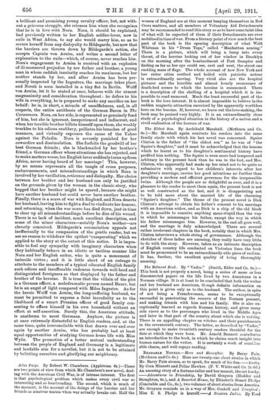The Eldest Son. By Archibald Marshall. (Methuen and Co. 6s.)—Mr.
Marshall again conducts his readers into the same family circle with which his last novel was concerned. Squire Clinton is the father of "the eldest son" as he was of "the Squire's daughter," and it must be acknowledged that the lessons which he learnt as to his daughter's sentimental history have profited him nothing. The Squire is even more bad tempered and arbitrary in the present book than he was in the last, and Mrs. Clinton, who apparently had made up her mind not to be quite so submissive with regard to her children's interests after her daughter's marriage, carries her good intentions no further than providing a modern and efficient governess for the irrepressible twins. Although the people are as delightful as ever, and it is a pleasure to the reader to meet them again, the present book is not so well constructed as the last, and it is disappointing not to be told more about the married life of the charming " Squire's daughter." The theme of the present novel is Dick Clinton's attempt to obtain his father's consent to his marriage with an American widow, and as Dick is a chip of the old block it is impossible to conceive anything more stupid than the way in which he mismanages his father, except the way in which his father mismanages him. However, in the end all goes well, and the marriage is duly acknowledged. There are several rather irrelevant chapters in the book, notably that in which Mrs. Clinton interviews a whole string of governesses. Although the sketches of these ladies are amusing, they really have very little to do with the story. However, taken as an intimate description of English country life conducted on Victorian lines the book must be pronounced to be an extraordinarily able piece of realism. It has, further, the excellent quality of being thoroughly amusing.


























































 Previous page
Previous page